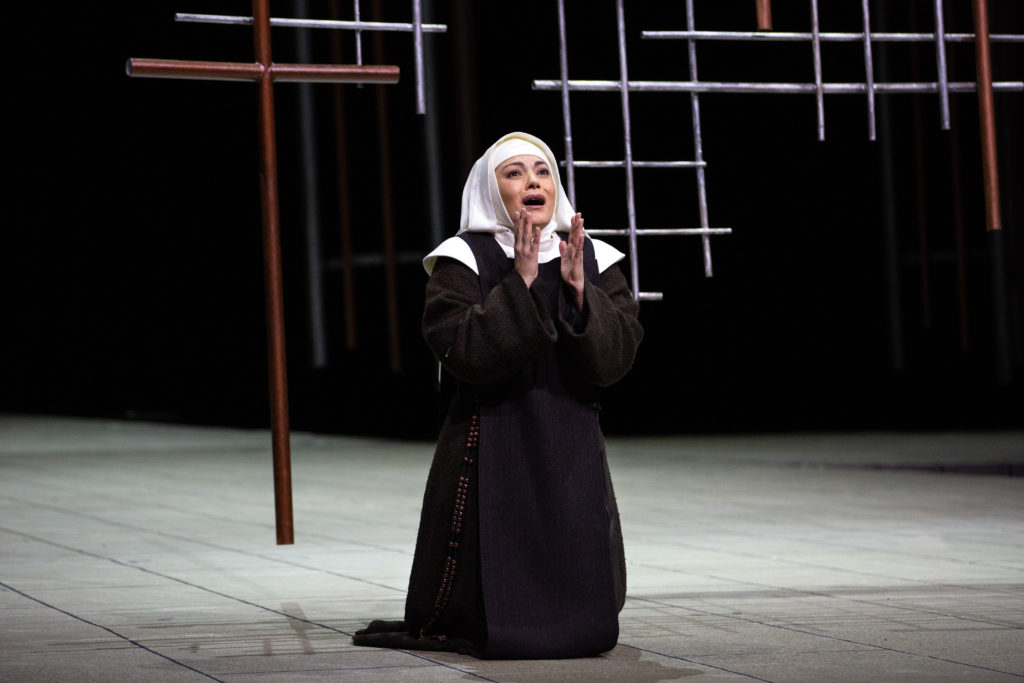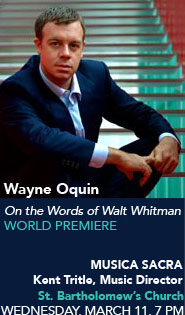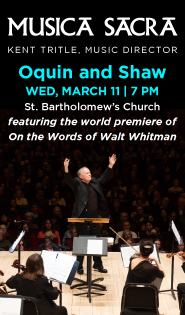Met Opera’s “Dialogues des Carmélites” is a devastating, emotional tour de force

Debuts abounded in the season premiere of Poulenc’s Dialogues des Carmélites at the Metropolitan Opera on Sunday afternoon. New to the Met were Sabine Devieilhe as Constance and Piotr Buszewski as the Chevalier de la Force. Add three major international stars making role debuts — Ailyn Pérez as Blanche de la Force, Alice Coote as Madame de Croissy, and Jamie Barton as Mère Marie — and anticipation as well as curiosity were running high.
The opera is based on the true story of the Martyrs of Compiègne, a cloistered community of sixteen Carmelite nuns who were guillotined in the final days of the Reign of Terror following the French Revolution. It is the rare twentieth-century opera that immediately found a place in the repertory and remained there.
With John Dexter’s classic 1977 production as a backdrop, expectations were met and often exceeded in this performance both vocally and dramatically. What set this performance apart, however, was the realness of the sense of community that the sixteen women of the cast created.
With its starkness, Dexter’s production reinforces this concept by placing most of the action in the center of the white crucifix outlined on the stage floor. The nuns’ physical bond is as apparent as their spiritual one. But it was Christine Goerke, returning to the role of Madame Lidoine, who really forged the closeness between herself as the prioress and the women under her authority and care as they surmount uncertainty and embrace martyrdom.
Goerke did this by force of character, but also by bringing maternal warmth and a joy to the role which were evident even when she was mounting the scaffold. It wasn’t through her acting alone, however, that Goerke crafted her superb Lidoine; her voice had much to do with it also.
The role is perfect for her at this stage of her career. Her soprano has a fascinating vibrancy, which expresses emotion as easily as sound. There were other compelling performances, but it was Goerke who commanded the stage.
Barton likewise was an exceptional Mère Marie. Her rich, plummy mezzo-soprano is in prime condition and as imposing as Goerke’s soprano. Mère Marie is a constant presence throughout the opera, and fate dictates that she is the lone survivor of the community. It’s perhaps the most complex role in Dialogues des Carmélites and Barton’s keen dramatic instincts made the character real.
Pérez’s Blanche de la Force was a combination of timorous meekness and steely resolve. There is no doubt that the the societal unrest in pre-revolutionary Paris has unsettled her, but Pérez’s Blanche is running towards a spiritual life not to escape the world but in hopes of finding both peace and purpose. Pérez’s face expressed Blanche’s character as effectively as her voice, especially the beatific glow that emanated from her whenever her resolve was questioned.
Pérez’s voice is beautiful, and she sings with the great sensitivity to text, but it is light. More vocal presence was needed from her, especially in the extended quasi-recitative passages in Act I. Conductor Bertrand de Billy was ever attentive to balance, but still it was difficult to hear Pérez at times. Hopefully this will be remedied as the run progresses.
There were no problems hearing Devieilhe delightful, chattering Constance. Lightness was a hallmark of both her singing and acting, but there was a profound depth to Devieilhe’s Constance. Met audiences will undoubtedly be hearing more from her.
Coote is age-appropriate for Madame de Croissy according to the libretto; Constance irreverently declares that at 59, is it not time for her to die? Coote, however, is far younger than most singers who are cast in the role, and her relative youthfulness brought a fascinating dynamic to it. This was a vital woman in the prime of life, rather than a woman whose life force is all but spent. That difference made Madame de Croissy’s death scene all the more harrowing.
Buszewski, with his ringing, clear tenor, made a dashing, handsome Chevalier de la Force, who was the perfect counterpart to Pérez’s Blanche. Buszewski’s Chevalier was impudent and prone to action, while she was reticent and contemplative. The scene when he comes to the convent and pleads with her to flee with him was the most touchingly heartfelt in the opera.
As their father, the Marquis de la Force, Laurent Naouri gave a terrifying account of his wife’s carriage being attacked by a mob. He also expressed an understanding of his daughter’s character that his son failed to grasp. Tony Stevenson gave an equally nuanced performance as the chaplain, who persuades Mère Marie not to join the other sisters in death, convincing her that it is God’s will that she live.
The musical glories of Dialogues des Carmélites lie as much in the orchestral score and the hymns that the nuns sing throughout the opera, as in Poulenc’s natural, speech-like vocal writing. Apart from the few balance issues, de Billy led the Met Orchestra in a transparent, luminous performance of Poulenc’s colorful, if solemn score. The interplay of the woodwinds was particularly impressive in the final act.
The hymns play a pivotal role in creating the dynamic arc of the opera. Each emerged from the score as simple but exquisite musical gems. None more so than the “Salve Regina” which the sisters sing as they walk to their deaths, until only the lone voice of Blanche is heard singing the words that she had spoken when offering her life to God upon taking her vows.
It’s an ending unsurpassed in opera for its brutal honesty and dramatic impact. If this compelling cast isn’t enough to lure you to Dialogues des Carmélites, the final moments of the Met’s timeless production should be.
Dialogues des Carmélites runs through January 28. metopera.org



Posted Jan 19, 2023 at 5:33 pm by Ian Campbell
I have attended scores of Met productions over the decades. None has moved me as Sunday’s ‘Dialogues’ has. Mr. Perdian’s analysis is spot-on. Know the meaning of faith and devotion. Post-haste to the ticket window, and come shed tears of adoration as I have.